James Spader Shorts Interview
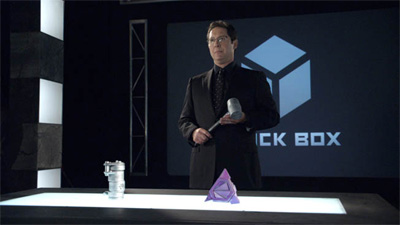
James Spader Relishes Over the Top Bad Guy
James Spader, Shorts Interview by Paul Fischer.James Spader has been keeping himelf busy since the cancellation of his Emmy award winning and critically acclaimed TV series Boston Legal. Apart from playing the evil Mr Black in the kids film Shorts from director Robert Rodriguez. He is also about to make his Broadway debut in a new David Mamet play that explores race in America. In his first major interview since Boston Legal, the always frank and fascinating actor talks TV politics, shooting digitally and remembering John Hughes, with whom he worked on Pretty in Pink.
Paul Fischer: Was it freeing for you to play a character like this in Shorts?
James Spader: It's even more freeing once it's over. It was really fun doing it. But it was whirlwind. I was down in Austin for about a week. I was amazed too when I read the script and I saw this part that was throughout the picture and a conventional film schedule likely would have taken a month and a half to shoot that. They should me in five or six days. It's a function of what Robert Rodriguez has such a tremendous confidence in how he puts the film together. He has found a way through technology and the people whom he works with and the facility he has down there and also through his imagination in the scripts he writes, he's able to shoot an incredible amount with very little. Working on the kids films that he's made since he was very young, even the little short films he made when he was first starting out, he would cast different family members. He has a large extended family. As long as he's been making those grown up, different genre films, he's been making kids' films and always concurrently. And always what he learns from one, he applies to the other. Because he's used to shooting these kids pictures, where he's having to constantly schedule around the kids going to school or the kids taking a break, the hours they can work and the hours they can't work, and so on and so forth, he has found a way to make it work for himself. Therefore, when they called me up and sent me the script and I thought I don't know how in the hell I'm going to do this because I'm shooting Boston Legal and we're on hiatus and I need to take a break, and they called up and said, it's going to take about five days to shoot you and I was just OK, I went down there as much for anything else I went down there to see how they hell they can do that, and they did.
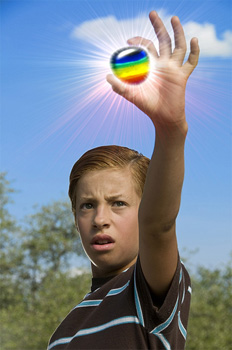 Paul Fischer: The characters could be over the top...
Paul Fischer: The characters could be over the top...James Spader: Oh. Could be? (chuckles) Are you kidding me? They're completely over the top. I think it's absolutely what the picture is. Even before I went down there, even just having a small sense of Robert's work, then when I met him and even when I read the script for "Shorts," it was clear it his film. This is a man who writes, directs, produces, he shoots camera, he edits the films, he composes the music, he plays the music, he does visual effects--his hands are on every single solitary frame of this picture, and every performance is shaped by him. The pictures are his. Every one of the movies he makes are entirely his. Everybody is there to serve whatever it is that has jumped out of his head. When I showed up there, I showed up with really almost the opposite work ethic I had on six years of playing this character I had played on Boston Legal, and a lot of other films I had done, which was to bring an awful lot to the table myself, to bring as much as I can to bear. And there, instead, I just sort of gave it up to Robert and whatever he wanted, if he wanted me to say it louder and scream it louder with eyes wider and bigger and flail my arms around even broader, then sobeit, because he's got it in his head what it's going to look like. And it's impossible on the set to tell yourself to have any idea what it's going to look like because so much of it is created behind the scenes.
Paul Fischer: Have you seen the finished film yet?
James Spader: Yes.
Paul Fischer: How surprised were you by the end result?
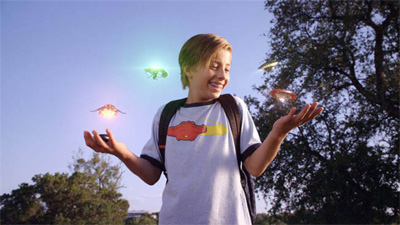 James Spader: I'd read the script so I had some sense, at least on paper, of what it was going to look like, but all of it is new. Surprised even in the scenes where I'm there with the visual effects but also to see some of the other performances that are across from me because very often if I'm shooting at 10 p.m. or 11 p.m. and I'm doing a scene where I'm playing across from my son or daughter in the picture, well, they're not there. (chuckles) They're at home asleep or they're in school. Yet the next morning when they're shooting their part of a scene I may not be there because I finished shooting at midnight the night before. Even some of the performances I'm seeing in that way, I'm seeing for the first time.
James Spader: I'd read the script so I had some sense, at least on paper, of what it was going to look like, but all of it is new. Surprised even in the scenes where I'm there with the visual effects but also to see some of the other performances that are across from me because very often if I'm shooting at 10 p.m. or 11 p.m. and I'm doing a scene where I'm playing across from my son or daughter in the picture, well, they're not there. (chuckles) They're at home asleep or they're in school. Yet the next morning when they're shooting their part of a scene I may not be there because I finished shooting at midnight the night before. Even some of the performances I'm seeing in that way, I'm seeing for the first time.Paul Fischer: Are these themes in Shorts that adults can relate to like miscommunication and being preoccupied with technology and the relationship between parent and daughter and were those things that appealed to you?
James Spader: Yeah. I loved all of it. Someone asked me if I had a wish that you would have wished for and I said, and I think this is what the movie's about, you don't have one wish when you're a kid, you've got a limitless number of wishes, and we do as adults too. Sometimes, you'd think with time and wisdom you'd realize you should prioritize your values and prioritize your wishes but we don't though. Robert's got a large family. Not only did he grow up in a large family but he's got a large family himself. He's got a lot of kids. They're around a lot. It was always sort of hard to tell on the set which kids were acting in the movie and which kids were playing around on the set. There are always a lot of kids around and he's really comfortable with that. He's great at communicating with young actors. He communicates with them exactly the same way he communicates with me. I don't think I'm unique among the adults on the set. Maybe I'm the only adult on the set that he communicated as he did with the 10-year-olds. He's very adept at that and I think I've wound myself into a corner and I'm not sure I've answered your question.
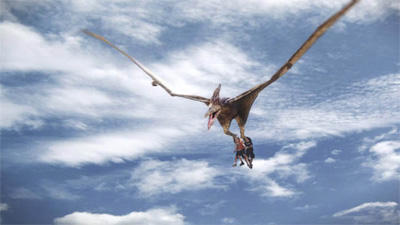 Paul Fischer: Were you comfortable with so many kids on set?
Paul Fischer: Were you comfortable with so many kids on set?James Spader: It was never a headache. I've worked with a lot of kids. The show I worked on for a while we'd have regularly episodes that had younger actors and actresses and I'm very comfortable with it. I find that young actors and actresses are tremendously eager and also very often much more and understandably so, much more professional than some of their older counterparts. They just are. They want to do the right thing.
Paul Fischer: Did they ask for acting tips?
James Spader: No. I don't know if they're familiar with my work, really. I haven't really spent a great deal of time doing films that would be appropriate for kids to see. So this may be the first.
Paul Fischer: Robert is an original voice, as was John Hughes. Did you realize when you were working with (Hughes) the impact it was going to have?
James Spader: I've never been aware of any - I hate to say it but my head is buried when I make a picture. It's just as buried. And even to this process. This is always the first step in reflecting on what you've done. This is it. Very often in this arena you have to be objective in a way that you haven't been up until that point. At least for me. Making a film for me is so subjective. Depending on what the picture is, sometimes I can't see the forest for the trees, because I have to immerse myself in the making of it. So I don't have the objectivity to step back and say oh what's the impact of this or what is this? Very often, I've never had the objectivity to speak very eloquently about what I've done. There have been a couple pictures where I've called up the director before doing something like this and asking, what was the film about?
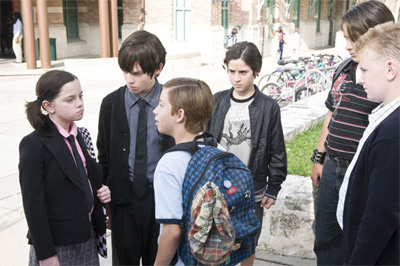 Paul Fischer: What's John Hughes' legacy?
Paul Fischer: What's John Hughes' legacy?James Spader: I'm not entirely sure. It's not something I've talked about or reflected upon at all, but I will say this, I have noticed the people who grew up watching those pictures are now adults. And I run into them every so often and those pictures were part of their childhood, and that's a different perspective for me, because for me that was a job I did and one of many jobs and it didn't inform who I am very much. I didn't grow up doing that. I became an adult and I went and did a picture and when I wrapped that I went and did another picture. But I have started to meet, and I also read, when John died the other day, I read a couple of things in the LA Times and some quotes from directors working today (like) Judd Apatow was quoted quite heavily in the article I read, and suddenly for the first time, I actually thought about the notion that there were people who were growing up at that time and seeing those pictures and were influenced by that.
Paul Fischer: Are you looking forward to your Broadway debut?
James Spader: I am, very much so, I am. It's funny. As it's turned out two things have followed doing this TV show. First, doing this Robert Rodriguez picture and then going and doing the play, this new David Mamet play. They are two -- I've never been good at planning anything in my life and I certainly have been least of all been good at planning any kind of career and yet just dumb luck, this picture and this new David Mamet play seem to be the absolute perfect thing for me following doing that TV show.
Paul Fischer: Who else is in the play besides Kerry Washington and Richard Thomas?
James Spader: I think David Allen Grier is doing it.
Paul Fischer: The name "Race," seems like it opens a door like the Gates arrest in Cambridge did. Is it stepping into that kind of minefield?
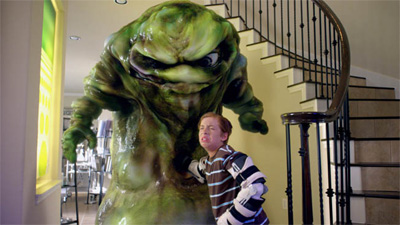 James Spader: I spoke to David the other day and he mentioned that he wishes that Professor Gates and Officer Crowley had actually waited a few months before they had their encounter for our sake. Anyway, there's a way to keep the conversation going. Maybe the press will cover their next get-together, for instance, that they referred to at the White House. I think David Allen Grier is set for it as well now. I'm in a frustrating position because I'd love to sit and talk about this play for an hour because I'm excited about doing it and I hope it's everything it could be. What you know about the play is what David wants anybody to know about this play before it opens.
James Spader: I spoke to David the other day and he mentioned that he wishes that Professor Gates and Officer Crowley had actually waited a few months before they had their encounter for our sake. Anyway, there's a way to keep the conversation going. Maybe the press will cover their next get-together, for instance, that they referred to at the White House. I think David Allen Grier is set for it as well now. I'm in a frustrating position because I'd love to sit and talk about this play for an hour because I'm excited about doing it and I hope it's everything it could be. What you know about the play is what David wants anybody to know about this play before it opens.Paul Fischer: What have you learned about the politics of television from doing (Boston Legal) and how much improv was there between you and Bill Shatner?
James Spader: There was no improv between Bill and I during that series. By the time we'd show up on the set, the script was set. Our schedule was such that we were never able to rehearse prior to showing on up set on the day were to shoot it, and then we'd rehearse as much as we needed to figure out the shot and to figure out where Bill and I or Candace or any of the other cast members would be at any given time during the scene. Any discussions or reworking of dialogue and everything always happened prior to showing up on the set. In terms of the politics of television, I learned a lot. I knew absolutely nothing going in about television. Absolutely nothing going in. I know a little more now but I know to try very, very hard to do a television show that the network you're on owns the show, very important I think. I think that a strong dialogue and relationship that is constructive between network and production is enormously important for a show to be able to work efficiently, which we didn't have so much on that show. ABC did not own the show and we didn't have the most constructive dialogue between network and production and that was hard. It ended up burning up a lot of time and on a TV show you have no time. The network and the shows are always better served if they have a symbiotic relationship which I think now mostly is served by shows and networks that have a financial relationship of ownership. I don't know if it was always that way because I have nothing to compare it to but I know now it's become that way. The shows that ABC owned and us and some of the shows they didn't, the relationship is just so different. Just entirely different.
Paul Fischer: Where do you think Alan Shore would be 10 years from now?
James Spader: Oh God, I don't know. I hope we don't find out.
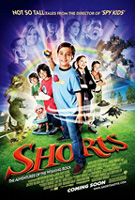
Shorts
Starring: Jon Cryer, William H. Macy, Leslie Mann, James Spader, Jimmy Bennett, Kat Dennings, Trevor Gagnon, Leo Howard, Devon Gearhart, Rebel Rodriguez, Jake Short, Jolie VanierDirector: Robert Rodriguez
Genre: Science-Fiction/Fantasy
Runtime: 89 mins
Shorts is set in the suburb of Black Falls, where all the houses look the same and everyone works for BLACK BOX Unlimited Worldwide Industries Incorporated, whose Mr. Black?s BLACK BOX is the ultimate communication and do-it-all gadget that?s sweeping the nation. Other than keeping his parents employed, however, Mr. Black?s BLACK BOX has done nothing for 11-year-old Toe Thompson, who just wants to make a few friends... until a mysterious rainbow-colored rock falls from the sky, hits him in the head and changes everything.
The Rainbow Rock does Mr. Black?s BLACK BOX one better: it grants wishes to anyone who holds it. Before long, wishes-gone-wrong have left the neighborhood swarming with tiny spaceships, crocodile armies, giant boogers... and outrageous magical mayhem around every corner. But it?s not until the grown-ups get their hands on the Rock that the trouble really starts. Now Toe and his newfound friends must join forces to save their town from itself, discovering along the way that what you wish for is not always what you want.
MORE





